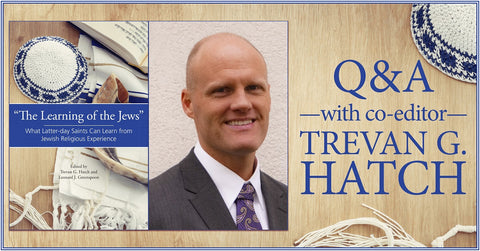Q&A with Trevan G. Hatch, co-editor of "The Learning of the Jews": What Latter-day Saints Can Learn from Jewish Religious Experience August 03 2021

Q: Can you provide a little background about the editors and your decision to do this project together?
A: I participated with Leonard Greenspoon in several Jewish Studies seminars in Chicago from 2012 to 2018. In 2016 I approached him about getting Jewish scholars and LDS scholars together for this writing project. As a prolific scholar in Bible and Jewish Studies for forty years, Leonard has participated in these types of interfaith interactions many times, but never with Latter-day Saints. Leonard and I then contacted several scholars to participate. Many of the Jewish scholars were excited to write essays due to the unique nature of the project.
Q: What makes this book unique among interfaith dialogues?
A: Traditional interfaith dialogues are very common. So why do I call this project “unique”? Customarily, the purpose of interfaith dialogue is for two groups to come together and discuss commonalities. The “Kumbaya” nature of these interfaith dialogues serve to foster understanding and empathy. This project is unique because we did NOT want to follow the typical style of each group learning from each other. In other words, we did not want to tell Jews that Latter-day Saints want to learn from them, but that they must learn from Latter-day Saints as well. Christians have forced Jews for 1,500 years to learn about Christianity (or even convert to Christianity). In this volume, we sought to give Jews “the microphone” so-to-speak and let them talk about their own experience without imposing an agenda on them. Our intent was to discuss and examine Judaism on Jewish terms (as best we can) and subsequently wrestle with how Latter-day Saints might benefit from 3,000 years of the Jewish experience. Our purpose is not to suggest that Latter-day Saints must adopt various Jewish practices and beliefs. Rather, we hoped that the discussions in this volume may assist readers in adopting strategies, mentalities, and approaches to religious and cultural living as exemplified by Jews and Judaism. The chapters are meant to serve as catalysts for further introspection and learning, not as the end-all-be-all for how Latter-day Saints might learn from Jewish religious experience.
Q: How is this book organized?
A: This volume brings together fifteen scholars, seven Jewish and eight Latter-day Saint, with a combined academic experience of over four hundred years. We have structured the volume around seven major topics, two chapters on each topic. A Jewish scholar first discusses the topic broadly vis-à-vis Judaism, followed by a response from a Latter-day Saint scholar. These Latter-day Saint scholars are trained in various fields of study and disciplines including history, sociology, family studies, religious studies, biblical studies, and literature. This wide array of experience and training illustrates the various approaches and perspectives of learning from another group. With the primary purpose of this volume being for Latter-day Saints to learn from Jewish religious perspectives and experiences, the essays are generally different from what you might expect in an interreligious dialogue. For the most part, the Jewish essays were not written with Latter-day Saints in mind but are simply broad overviews that could be helpful for any non-Jewish readership. Likewise, the Latter-day Saint responses are not trying to find commonalities as the primary goal; rather, their purpose is to explore any strategies, mentalities, motives, etc., of Jews that might serve as a catalyst for Latter-day Saints to look introspectively and enhance their own lived religious experience.
Q: Can you highlight some of the main topics discussed in the book?
A: The seven topics include scripture, authority, prayer, women and modernity, remembrance, particularity, and humor. Most of these topics are salient in Jewish discourse today. It so happens that Latter-day Saints focus on several of these topics with a great amount of zeal, especially scripture, authority, prayer, and women & modernity.
Q: What are you hoping that readers will take away from this book?
A: We hope that the reader will not only learn a great deal about Judaism and the Jewish experience while reading this volume, but also use what they learn to enhance their own cultural and religious experience.
Trevan Hatch, August 2021
